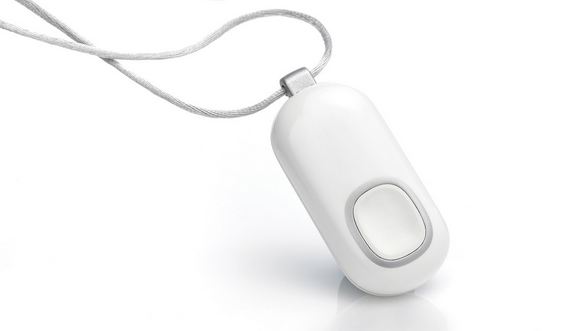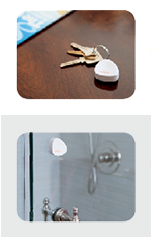July is Sandwich Generation Month, a time for us to celebrate the dedication and loving kindness of adults who are currently taking care of both their children and their parents. Imagine the pressures they must deal with every day — as well as the fear and anxiety they must live with when they consider the declining health of their aging parents. Perhaps Mom or Dad insists on living independently, but they want to make sure he or she is safe. What options are there? How can parents maintain their independence while making sure they’re okay?
In honor of Sandwich Generation Month, we’d like to discuss the various forms of Personal Emergency Response Systems (PERS), their benefits and shortcomings, and how you might go about choosing the right system for your loved one. Although recent systems have become steadily more elaborate, the traditional design includes two simple parts: a console that plugs into the telephone and a pendant worn around the wrist or neck. Ideally, it would never be used, but in the event of any medical emergency, your loved one would simply press the button on the console or pendant to connect to an emergency medical dispatcher.
“Imagine the pressures they must deal with every day — as well as the fear and anxiety they must live with when when they consider the declining health of their aging parents.”
Other more elaborate services provide more comprehensive behavior tracking devices to ensure that your loved one or you will be taken care of. Recent developments in the use of accelerometers and gyroscopes have led to automated response systems. Sensors in these devices can tell when your loved one has taken a hard fall. However, these are often significantly more expensive than typical PERS options and have been criticized for their inaccuracy — which could lead to unwanted and often embarrassing false alarms. But the technology has been improving and, according to Medical Alert Device, 80% of users have no false alarms per month, and 90% have one or fewer.
Companies like Lively offer even more comprehensive services by placing sensors throughout your loved one’s house. With a sensor on the fridge, on the front door or attached to a medicine box, your loved one can assure you of his or her safety without having to think about it. These sensors send an activity report through the mail to you or whomever your loved one designates, letting you know when he or she opens the door, goes outside, gets something to eat or takes his or her medicine. To some readers, the idea of people knowing what you’re doing at any point in the day may sound a bit creepy. But for some, it may be necessary, such as with people suffering from dementia — or others who simply get a little forgetful when it comes to taking care of themselves.
Credit: Examples of Lively sensor fob attached to keychain and sensor attached to movable everyday object.
“Ideally, they would never be used, but in the event of any medical emergency, your loved one would simply press the button on the console or pendant to connect to an emergency medical dispatcher.”
These few examples capture only a glimpse of a massive market with numberless features and gadgets. Because of all the companies and services out there, it’s important that you know what qualities to look for. Here’s a short list of some key aspects you’d want in a PERS:
1. Waterproof. Many falls happen in the shower.
2. Comfortable. If your loved one is going to be carrying a device all the time, it better not be a hassle.
3. Easy to use. A PERS is pointless if your loved one doesn’t know how to use it.
4. Notifications when it’s low on batteries. Since the PERS may one day save your loved one’s life, it must always be charged and ready to go.
Of course there are certainly several other important aspects to a good PERS, and we encourage you to talk to doctors and nurses, to providers in your area, to your friends and family — and especially to your loved one. Research is your best ally in securing your loved one’s safety.
But we should remember that an emergency system, though perhaps necessary in certain circumstances, is no replacement for the warmth and care of a person. Though we may not always be there for our loved ones, we must do our best to be present as much as possible, even if we must rely on some help from these PERS services. Of course, baby boomers know this better than anyone. Here at the end of Sandwich Generation Month, it’s still not too late to call your mother or daughter, father or son, and express your appreciation for him or her and all the caring and responsibility he or she has taken on in their adulthood.
What are your experiences with medical alert systems? We look forward to your comments below.
More from “Something Special”:
- How Wisdom Depends on a Good Life
- A No-Fear Approach to Death
- Facing the End of Life with Courage: Photographs from “A Good Death”
Related articles:
- Global Medical Alert Systems Market (2013-2020)

 How Can the Elderly Keep Their Independence?
How Can the Elderly Keep Their Independence?





 “Other Side” Documentary Directed by Carter Oakley and Heather Hogan
“Other Side” Documentary Directed by Carter Oakley and Heather Hogan
















